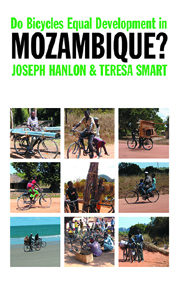Book contents
- Frontmatter
- Contents
- Acknowledgements
- The authors
- Money & measurements
- Abbreviations, acronyms & glossary
- Part I IS THERE DEVELOPMENT IN MOZAMBIQUE?
- Part II ACTORS & CONTEXT
- Part III ALTERNATIVES & THE DEVELOPMENTAL STATE
- 13 Questioning the cargo cult
- 14 Increase demand to kick-start the economy
- 15 Agriculture & the new role for the state
- 16 Finance & a development bank
- 17 The developmental state builds capitalism
- 18 Can Mozambique stop putting its hand out & become a development state?
- Appendix 1 Aid
- Appendix 2 Investment & other tables
- Bibliography
- Index
17 - The developmental state builds capitalism
from Part III - ALTERNATIVES & THE DEVELOPMENTAL STATE
Published online by Cambridge University Press: 05 April 2013
- Frontmatter
- Contents
- Acknowledgements
- The authors
- Money & measurements
- Abbreviations, acronyms & glossary
- Part I IS THERE DEVELOPMENT IN MOZAMBIQUE?
- Part II ACTORS & CONTEXT
- Part III ALTERNATIVES & THE DEVELOPMENTAL STATE
- 13 Questioning the cargo cult
- 14 Increase demand to kick-start the economy
- 15 Agriculture & the new role for the state
- 16 Finance & a development bank
- 17 The developmental state builds capitalism
- 18 Can Mozambique stop putting its hand out & become a development state?
- Appendix 1 Aid
- Appendix 2 Investment & other tables
- Bibliography
- Index
Summary
Colonialism and a brief dabble with socialism mean that, for strong historical reasons, Mozambique does not have an entrepreneurial tradition. If it is to build a productive national bourgeoisie and entrepreneurial class that will create jobs, then the state will need to take an active role in building domestic capitalism – just as states in the now industrialised countries did in the nineteenth and twentieth centuries. In contemporary clichés, in the ‘free market’ the ‘playing field’ is tilted in favour of those who already have money and experience; in Mozambique's case these are largely foreigners. Only the state can level the playing field, through a mix of active intervention, subsidy and regulation. This, historically, has been the role of the developmental state.
Of course, it would be easier and more comfortable to continue the present policy of comprador or parasitic capitalism, or rent-seeking, where the elite simply takes a cut from aid and the investments of more experienced foreigners. And, as we argued in Chapters 11 and 16, the donors and BWIs would be comfortable for this to continue. Few would argue now for socialism (indeed, few now admit they ever did). But there are Mozambican nationalists and developmentalists who also challenge the neo-liberal myth that the ‘free market’, by itself, will end poverty and develop Mozambique. They see, as we argued in Chapter 7, that it is not happening.
- Type
- Chapter
- Information
- Do Bicycles Equal Development in Mozambique? , pp. 188 - 199Publisher: Boydell & BrewerPrint publication year: 2008

